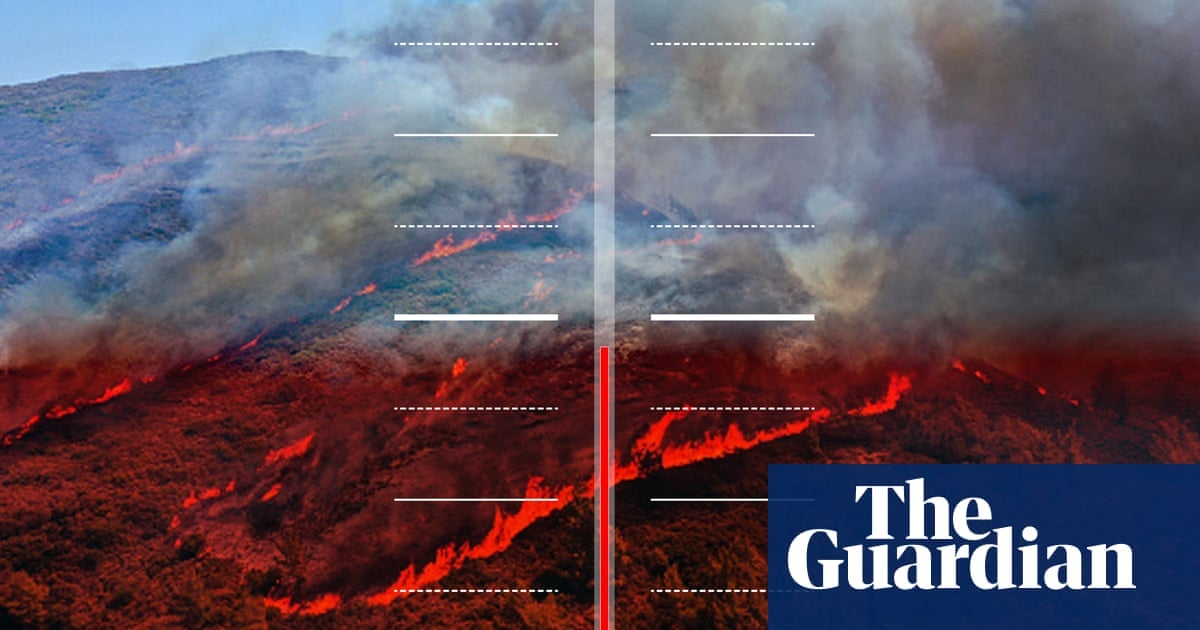Planet is headed for at least 2.5C of heating with disastrous results for humanity, poll of hundreds of scientists finds
Hundreds of the world’s leading climate scientists expect global temperatures to rise to at least 2.5C (4.5F) this century, blasting past internationally agreed targets and causing catastrophic consequences for humanity and the planet, an exclusive Guardian survey has revealed.
Almost 80% of the respondents, all from the authoritative Intergovernmental Panel on Climate Change (IPCC), foresee at least 2.5C of global heating above preindustrial levels, while almost half anticipate at least 3C (5.4F). Only 6% thought the internationally agreed 1.5C (2.7F) limit will be met.
Many of the scientists envisage a “semi-dystopian” future, with famines, conflicts and mass migration, driven by heatwaves, wildfires, floods and storms of an intensity and frequency far beyond those that have already struck.
Numerous experts said they had been left feeling hopeless, infuriated and scared by the failure of governments to act despite the clear scientific evidence provided.



Anyone who hasn’t had their head up their ass has been aware of this. Life will be extremely shitty by the mid century. If you haven’t made the horrible choice to reproduce, be sure that you don’t. There will be no future worth living for those born today.
not sure about no future but certainly a shitier one all around. but yeah I don’t know how anyone is not aware that 1.5 is a long past pipe dream at this point.
Gonna be much quicker than 25yrs.
But for a brief period of history we made a few people even more disgustingly rich than ever, so it’s totally worth the climate catastrophe and of course economic ruin to come in the next few decades.
What exactly do you predict in terms of lifestyle changes by mid century?
It isn’t my personal predictions. It is the predictions made by climate scientists and even the military industrial complex (based on climate models). We’ve already begun to see the effects and they will get worse. Extreme weather events, massive migration, famine, drought, and war. This is what the future holds, even if developed countries can dampen the impacts for a time, they won’t be immune. It isn’t great.
Based on the scientific sources you’re referring to, are there any specific predictions in terms of certain numbers by certain dates?
Like are we talking 50% loss of farmland? Are we talking 50% increase in farmland? Are we talking by 2030, by 2050, by 2070, what?
I don’t have specifics memorized, of course. If you’d like specifics; the EU, NOAA, UN, USDOD, EPA, NASA, etc, have all released predictions along with sources you can dive into. It has been getting worse over the last 15 years, as far as predictions.
You have the Great Depression and 2008 financial crisis. That’s going to be the permanent state after 2050. Few jobs, high prices, that kind of misery.
Any quantifiable predictions? Words like “few” and “high” don’t really lead to falsifiable claims.
Of course not. You’re never sure if another war starts or when another COVID happens. Nobody can make quantifiable predictions. Those that do are trying to sell you something.
Are you joking? Quantifiable predictions are the basis of science. It’s called hypothesis. It’s why we use statistics: setting numerical thresholds for significance allows us to look at ambiguous data and draw conclusions we know are free from our own perceptual biases.
Who on earth told you that quantifiable predictions are for people trying to sell you something?
Economists. It’s about jobs and prices after all. It’s even debated if economics is a science.